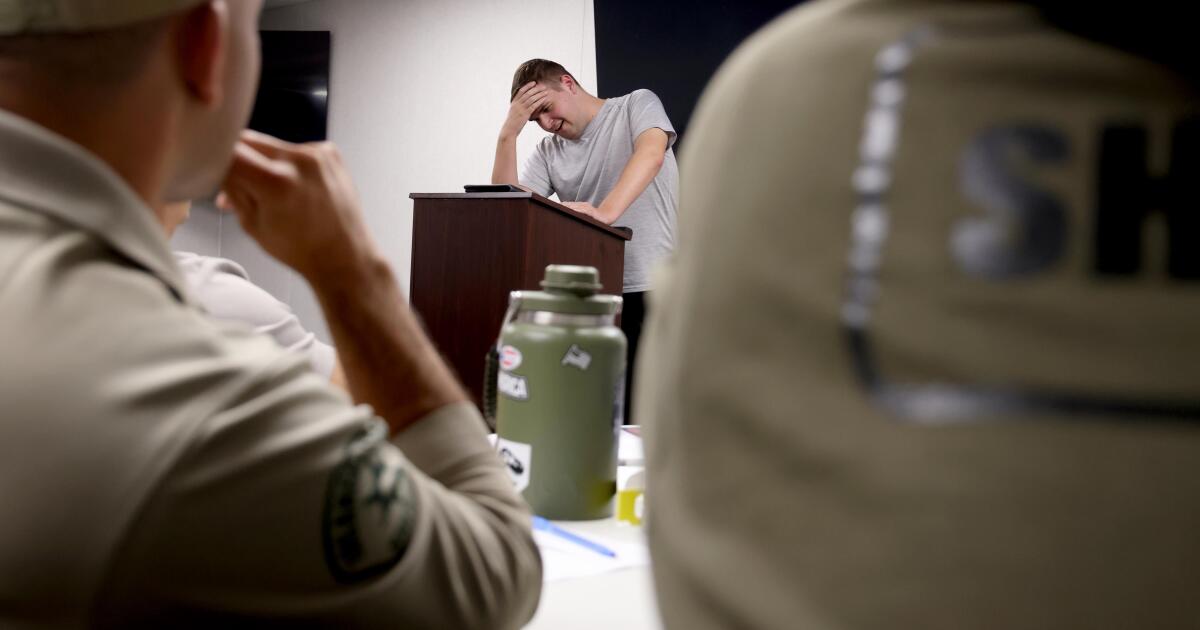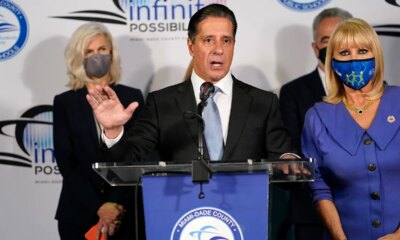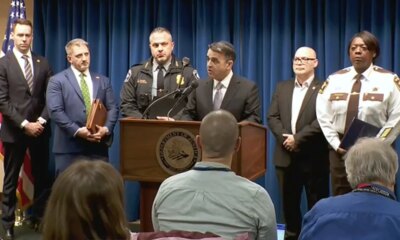Science
Column: A cancer survivor's advice: research, persistence and second opinions

In the fall of 2022, Robin Clough and Dr. Gene Dorio were going about their lives as they had for many years, serving older adults in the Santa Clarita Valley. Clough was busy with her work as an administrator at the local senior center while Dorio, a house-call geriatrician, crisscrossed the valley visiting his patients.
In November of that year, Clough saw a lump on her neck and had it checked out. The early indication was that she had papillary thyroid cancer.
“I was somewhat worried,” said Clough, but not overly so, because she knew that type of cancer was treatable and highly survivable. “So in the back of my mind it was like, ‘Oh, I’m so lucky. … It’s the easiest type of cancer to take care of.’”
California is about to be hit by an aging population wave, and Steve Lopez is riding it. His column focuses on the blessings and burdens of advancing age — and how some folks are challenging the stigma associated with older adults.
Then things took a sharp turn for the worse. “I noticed it growing a lot,” Clough, 70, said of the lump. “I was having trouble speaking.”
Surgery was scheduled. Dorio, 72, said it was expected to take about three hours to remove the tumor and half of Clough’s thyroid gland. But the procedure dragged on. When the surgeon updated Dorio nine hours later, the news was grim. The tumor had spread through the thyroid gland, onto the carotid artery and into the tracheal rings.
“He told me it was all over the place,” Dorio said.
Tests revealed that Clough had anaplastic thyroid cancer, a far more aggressive form than papillary.
We all know our fortunes can turn without much warning, especially as we age and the odds stack against us, raising the threat of our bodies gradually failing and our minds fading. But in just a couple of weeks, Clough and Dorio had gone from cruising through life to confronting death.
Dr. Gene Dorio kisses Robin Clough in the kitchen of their home. Dorio, a house-call geriatrician, has been spending much of his time caring for Clough.
(Genaro Molina / Los Angeles Times)
With her type of cancer, life expectancy is often measured in months rather than years. “It was so hard to process, and I think my mind stopped me from processing it because it’s just too overwhelming,” Clough said.
They’d fallen for each other about 20 years ago after each had been married and divorced. Dorio has a daughter named Janene. Clough has two daughters, Catie and Amy. The Dorio-Clough courtship and blending of the two families began with him giving her a flu shot at her senior center; then he had her on his local radio show, “The Senior Hour.”
They never married, and still don’t see the need.
“We’re compatible and we love each other … and have the same interests — fighting for people’s rights,” said Dorio, who, along with Clough, pushed for legislation — signed by Gov. Gavin Newsom — giving families more authority to determine medical decisions for loved ones even in the absence of an advance directive. Dorio had also served on the L.A. County Commission for Older Adults.
Robin Clough recalls how difficult the weeks of cancer treatment have been.
(Genaro Molina / Los Angeles Times)
Facing her grim diagnosis, Clough and Dorio leaned on each other and on Janene, Catie and Amy. There were weekly Zoom meetings to bolster spirits and share information about emerging therapies.
I’d gotten to know Dorio a little bit over the years, having tagged along on his house calls, so I was copied on the periodic updates on Clough’s status that he mailed to friends and family. She beat the three-to-six-month prediction, and in July of 2023 Dorio wrote to say she was better, “but still has a ways to go.”
By then, she’d undergone seven consecutive weeks of chemotherapy and radiation, suffering skin burns on her neck from the latter. A metastatic lesion was surgically removed from her leg. Dorio took Clough to MD Anderson Cancer Center in Houston on a recommendation from Cedars-Sinai.
“To all our friends and family,” Dorio wrote in that July update, “seeking a second opinion and being persistent in researching and asking questions of your doctor team is very important, no matter what the diagnosis might be. It is physically and emotionally a roller coaster. But we have been given wonderful support from our family and many of you in the community. We will provide help and guidance in the future should you need it.”
In Houston, medical staff queried Clough about her family history. “This cancer is mostly caused by radiation exposure,” Clough said, “and one of the first things they asked me … was where did you grow up?”
Her answer was Arizona, downwind from nuclear weapons testing in nearby Nevada in the 1940s and ’50s that contaminated water, soil and food sources for years.
I asked Clough if she had seen the Oscar-winning movie “Oppenheimer,” about the creation of the first nuclear weapons.
“I won’t watch it,” she said firmly.
It’s impossible to directly link Clough’s cancer to weapons testing, but the federal Centers for Disease Control and Prevention reports that people exposed to radiation fallout, “especially during childhood, may have an increased risk of thyroid disease, including thyroid cancer many years later.”
Oncologists Alain Mita at Cedars-Sinai and Maria Cabanillas at MD Anderson, who had collaborated previously on patients with anaplastic thyroid cancer, determined that Clough’s form of cancer warranted treatment with Keytruda, a drug that stimulates the immune system.
But after a few months of treatment that had showed some promise, the cancer was growing again. In late December, Clough’s doctors switched to a drug called Retevmo, a targeted therapy that blocks the driver of tumor growth.
Dr. Gene Dorio put off hip surgery to take care of his partner, Robin Clough, and uses a cane for support.
(Genaro Molina / Los Angeles Times)
A hopeful Dorio recalled that in a 2017 blog post, he had written that “genetic engineering research is on the verge of finding the DNA ‘stop button’ ” for cancer cell growth. He added, “Hopefully one day our great-grandkids will ask … ‘What was cancer?’”
One month into Retevmo medication, Clough had to stop because of adverse side effects to her liver. But a new scan revealed what seemed to her like a miracle.
The cancer was gone.
Two months later, she had another test.
No cancer.
“Her cancer is, at this moment, undetectable and in remission. For anaplastic cancer that’s very unusual,” Dr. Mita told me.
That doesn’t mean the cancer won’t return, he said. But for the time being, there’s cause for optimism.
Mita said that 10 years ago he could not have predicted this measure of success against such an aggressive cancer, and he’s hopeful medical science will see more advances in the coming years. With some cancers, he said, doctors are now able to skip chemotherapy and radiation in favor of meds like those used to treat Clough.
Cabanillas shared his optimism, saying survival rates at MD Anderson have improved with some forms of anaplastic thyroid cancer by using “immunotherapy in combination with targeted therapy.”
In her kitchen a few days ago, with the girls’ college diplomas and family photos hanging on the walls, Clough said it’s all been overwhelming at times, and Dorio chimed in on his own worries and determination to remain strong for her sake. Clough’s life has been consumed by doctor visits, surgical procedures, continued unpleasant side effects from treatment and the constant anxiety of awaiting the next test results.
“I never felt like it was too much,” Clough said. “There are times when I think, I’m so tired of this. But it’s never been too much, and I think that’s because of my loved ones.”
Dorio, meanwhile, put his practice on hold to focus on the house-call patient who lives in his own home. He’s been putting off hip replacement surgery, too, and uses a cane.
It’s more than a little helpful, Clough said, when, in the midst of a life-threatening medical crisis, the person you live with is a doctor. She said she never felt that she could beat cancer entirely, “but that I could keep it under control. And I still have that hope.” Each day, she said, is a bonus.
Clough shed a few tears as she told her story, but also flashed a radiant smile.
“I was supposed to be gone, but I’m not. So every day is ‘Wow,’ you know? I get to see my daughters, and in the process of this I had my first grandchild.”
The baby boy is now 11 months old.
His name is Robin.
steve.lopez@latimes.com

Science
Diablo Canyon clears last California permit hurdle to keep running

Central Coast Water authorities approved waste discharge permits for Diablo Canyon nuclear plant Thursday, making it nearly certain it will remain running through 2030, and potentially through 2045.
The Pacific Gas & Electric-owned plant was originally supposed to shut down in 2025, but lawmakers extended that deadline by five years in 2022, fearing power shortages if a plant that provides about 9 percent the state’s electricity were to shut off.
In December, Diablo Canyon received a key permit from the California Coastal Commission through an agreement that involved PG&E giving up about 12,000 acres of nearby land for conservation in exchange for the loss of marine life caused by the plant’s operations.
Today’s 6-0 vote by the Central Coast Regional Water Board approved PG&E’s plans to limit discharges of pollutants into the water and continue to run its “once-through cooling system.” The cooling technology flushes ocean water through the plant to absorb heat and discharges it, killing what the Coastal Commission estimated to be two billion fish each year.
The board also granted the plant a certification under the Clean Water Act, the last state regulatory hurdle the facility needed to clear before the federal Nuclear Regulatory Commission (NRC) is allowed to renew its permit through 2045.
The new regional water board permit made several changes since the last one was issued in 1990. One was a first-time limit on the chemical tributyltin-10, a toxic, internationally-banned compound added to paint to prevent organisms from growing on ship hulls.
Additional changes stemmed from a 2025 Supreme Court ruling that said if pollutant permits like this one impose specific water quality requirements, they must also specify how to meet them.
The plant’s biggest water quality impact is the heated water it discharges into the ocean, and that part of the permit remains unchanged. Radioactive waste from the plant is regulated not by the state but by the NRC.
California state law only allows the plant to remain open to 2030, but some lawmakers and regulators have already expressed interest in another extension given growing electricity demand and the plant’s role in providing carbon-free power to the grid.
Some board members raised concerns about granting a certification that would allow the NRC to reauthorize the plant’s permits through 2045.
“There’s every reason to think the California entities responsible for making the decision about continuing operation, namely the California [Independent System Operator] and the Energy Commission, all of them are sort of leaning toward continuing to operate this facility,” said boardmember Dominic Roques. “I’d like us to be consistent with state law at least, and imply that we are consistent with ending operation at five years.”
Other board members noted that regulators could revisit the permits in five years or sooner if state and federal laws changes, and the board ultimately approved the permit.
Science
Deadly bird flu found in California elephant seals for the first time

The H5N1 bird flu virus that devastated South American elephant seal populations has been confirmed in seals at California’s Año Nuevo State Park, researchers from UC Davis and UC Santa Cruz announced Wednesday.
The virus has ravaged wild, commercial and domestic animals across the globe and was found last week in seven weaned pups. The confirmation came from the U.S. Department of Agriculture’s National Veterinary Services Laboratory in Ames, Iowa.
“This is exceptionally rapid detection of an outbreak in free-ranging marine mammals,” said Professor Christine Johnson, director of the Institute for Pandemic Insights at UC Davis’ Weill School of Veterinary Medicine. “We have most likely identified the very first cases here because of coordinated teams that have been on high alert with active surveillance for this disease for some time.”
Since last week, when researchers began noticing neurological and respoiratory signs of the disease in some animals, 30 seals have died, said Roxanne Beltran, a professor of ecology and evolutionary biology at UC Santa Cruz. Twenty-nine were weaned pups and the other was an adult male. The team has so far confirmed the virus in only seven of the dead pups.
Infected animals often have tremors convulsions, seizures and muscle weakness, Johnson said.
Beltran said teams from UC Santa Cruz, UC Davis and California State Parks monitor the animals 260 days of the year, “including every day from December 15 to March 1” when the animals typically come ashore to breed, give birth and nurse.
The concerning behavior and deaths were first noticed Feb. 19.
“This is one of the most well-studied elephant seal colonies on the planet,” she said. “We know the seals so well that it’s very obvious to us when something is abnormal. And so my team was out that morning and we observed abnormal behaviors in seals and increased mortality that we had not seen the day before in those exact same locations. So we were very confident that we caught the beginning of this outbreak.”
In late 2022, the virus decimated southern elephant seal populations in South America and several sub-Antarctic Islands. At some colonies in Argentina, 97% of pups died, while on South Georgia Island, researchers reported a 47% decline in breeding females between 2022 and 2024. Researchers believe tens of thousands of animals died.
More than 30,000 sea lions in Peru and Chile died between 2022 and 2024. In Argentina, roughly 1,300 sea lions and fur seals perished.
At the time, researchers were not sure why northern Pacific populations were not infected, but suspected previous or milder strains of the virus conferred some immunity.
The virus is better known in the U.S. for sweeping through the nation’s dairy herds, where it infected dozens of dairy workers, millions of cows and thousands of wild, feral and domestic mammals. It’s also been found in wild birds and killed millions of commercial chickens, geese and ducks.
Two Americans have died from the virus since 2024, and 71 have been infected. The vast majority were dairy or commercial poultry workers. One death was that of a Louisiana man who had underlying conditions and was believed to have been exposed via backyard poultry or wild birds.
Scientists at UC Santa Cruz and UC Davis increased their surveillance of the elephant seals in Año Nuevo in recent years. The catastrophic effect of the disease prompted worry that it would spread to California elephant seals, said Beltran, whose lab leads UC Santa Cruz’s northern elephant seal research program at Año Nuevo.
Johnson, the UC Davis researcher, said the team has been working with stranding networks across the Pacific region for several years — sampling the tissue of birds, elephant seals and other marine mammals. They have not seen the virus in other California marine mammals. Two previous outbreaks of bird flu in U.S. marine mammals occurred in Maine in 2022 and Washington in 2023, affecting gray and harbor seals.
The virus in the animals has not yet been fully sequenced, so it’s unclear how the animals were exposed.
“We think the transmission is actually from dead and dying sea birds” living among the sea lions, Johnson said. “But we’ll certainly be investigating if there’s any mammal-to-mammal transmission.”
Genetic sequencing from southern elephant seal populations in Argentina suggested that version of the virus had acquired mutations that allowed it to pass between mammals.
The H5N1 virus was first detected in geese in China in 1996. Since then it has spread across the globe, reaching North America in 2021. The only continent where it has not been detected is Oceania.
Año Nuevo State Park, just north of Santa Cruz, is home to a colony of some 5,000 elephant seals during the winter breeding season. About 1,350 seals were on the beach when the outbreak began. Other large California colonies are located at Piedras Blancas and Point Reyes National Sea Shore. Most of those animals — roughly 900 — are weaned pups.
It’s “important to keep this in context. So far, avian influenza has affected only a small proportion of the weaned at this time, and there are still thousands of apparently healthy animals in the population,” Beltran said in a press conference.
Public access to the park has been closed and guided elephant seal tours canceled.
Health and wildlife officials urge beachgoers to keep a safe distance from wildlife and keep dogs leashed because the virus is contagious.
Science
When slowing down can save a life: Training L.A. law enforcement to understand autism

Kate Movius moved among a roomful of Los Angeles County sheriff’s deputies, passing out a pop trivia quiz and paper prism glasses.
She told them to put on the vision-distorting glasses, and to write with their nondominant hand. As they filled out the tests, Movius moved about the City of Industry classroom pounding abruptly on tables. Then came the cowbell. An aide flashed the overhead lights on and off at random. The goal was to help the deputies understand the feeling of sensory overwhelm, which many autistic people experience when incoming stimulation exceeds their capacity to process.
“So what can you do to assist somebody, or de-escalate somebody, or get information from someone who suffers from a sensory disorder?” Movius asked the rattled crowd afterward. “We can minimize sensory input. … That might be the difference between them being able to stay calm and them taking off.”
Movius, founder of the consultancy Autism Interaction Solutions, is one of a growing number of people around the U.S. working to teach law enforcement agencies to recognize autistic behaviors and ensure that encounters between neurodevelopmentally disabled people and law enforcement end safely.
She and City of Industry Mayor Cory Moss later passed out bags filled with tools donated by the city to aid interactions: a pair of noise-damping headphones to decrease auditory input, a whiteboard, a set of communication cards with words and images to point to, fidget toys to calm and distract.
“The thing about autistic behavior when it comes to law enforcement is a lot of it may look suspicious, and a lot of it may feel very disrespectful,” said Movius, who is also the parent of an autistic 25-year-old man. Responding officers, she said, “are not coming in thinking, ‘Could this be a developmentally disabled person?’ I would love for them to have that in the back of their minds.”
A sheriff’s deputy reads a pamphlet on autism during the training program.
(Genaro Molina / Los Angeles Times)
Autism spectrum disorder is a developmental condition that manifests differently in nearly every person who has it. Symptoms cluster around difficulties in communication, social interaction and sensory processing.
An autistic person stopped by police might hold the officer’s gaze intensely or not look at them at all. They may repeat a phrase from a movie, repeat the officer’s question or temporarily lose their ability to speak. They might flee.
All are common involuntary responses for an autistic person in a stressful situation, which a sudden encounter with law enforcement almost invariably is. To someone unfamiliar with the condition, all could be mistaken for intoxication, defiance or guilt.
Autism rates in the U.S. have increased nearly fivefold since the Centers for Disease Control began tracking diagnoses in 2000, a rise experts attribute to broadening diagnostic criteria and better efforts to identify children who have the condition.
The CDC now estimates that 1 in 31 U.S. 8-year-olds is autistic. In California, the rate is closer to 1 in 22 children.
As diverse as the autistic population is, people across the spectrum are more likely to be stopped by law enforcement than neurotypical peers.
About 15% of all people in the U.S. ages 18 to 24 have been stopped by police at some point in their lives, according to federal data. While the government doesn’t track encounters for disabled people specifically, a separate study found that 20% of autistic people ages 21 to 25 have been stopped, often after a report or officer observation of a person behaving unusually.
Some of these encounters have ended in tragedy.
In 2021, Los Angeles County sheriff’s deputies shot and permanently paralyzed a deaf autistic man after family members called 911 for help getting him to a hospital.
Isaias Cervantes, 25, had become distressed about a shopping trip and started pushing his mother, his family’s attorney said at the time. He resisted as two deputies attempted to handcuff him and one of the deputies shot him, according to a county report.
In 2024, Ryan Gainer’s family called 911 for support when the 15-year-old became agitated. Responding San Bernardino County sheriff‘s deputies shot and killed him outside his Apple Valley home.
Last year, police in Pocatello, Idaho, shot Victor Perez, 17, through a chain-link fence after the nonspeaking teenager did not heed their shouted commands. He died from his injuries in April.

Sheriff’s deputies take a trivia quiz using their non-writing hands, while wearing vision-distorting glasses, as Kate Movius, standing left, and Industry Mayor Cory Moss, right, ring cowbells. The idea was to help them understand the sensory overwhelm some autistic people experience.
(Genaro Molina / Los Angeles Times)
As early as 2001, the FBI published a bulletin on police officers’ need to adjust their approach when interacting with autistic people.
“Officers should not interpret an autistic individual’s failure to respond to orders or questions as a lack of cooperation or as a reason for increased force,” the bulletin stated. “They also need to recognize that individuals with autism often confess to crimes that they did not commit or may respond to the last choice in a sequence presented in a question.”
But a review of multiple studies last year by Chapman University researchers found that while up to 60% of officers have been on a call involving an autistic person, only 5% to 40% had received any training on autism.
In response, universities, nonprofits and private consultants across the U.S. have developed curricula for law enforcement on how to recognize autistic behaviors and adapt accordingly.
The primary goal, Movius told deputies at November’s training session, is to slow interactions down to the greatest extent possible. Many autistic people require additional time to process auditory input and verbal responses, particularly in unfamiliar circumstances.
If at all possible, Movius said, wait 20 seconds for a response after asking a question. It may feel unnaturally long, she acknowledged. But every additional question or instruction fired in that time — what’s your name? Did you hear me? Look at me. What’s your name? — just decreases the likelihood that a person struggling to process will be able to respond at all.
Moss’ son, Brayden, then 17, was one of several teenagers and young adults with autism who spoke or wrote statements to be read to the deputies. The diversity of their speech patterns and physical mannerisms showed the breadth of the spectrum. Some were fluently verbal, while others communicated through signs and notes.
“This population is so diverse. It is so complicated. But if there’s anything that we can show [deputies] in here that will make them stop and think, ‘Hey, what if this is autism?’ … it is saving lives,” Moss said.

Mayor Cory Moss, left, and Kate Movius hug at the end of the training program last November. Movius started Autism Interaction Solutions after her son was born with profound autism.
(Genaro Molina / Los Angeles Times)
Some disability advocates cautioned that it takes more than isolated training sessions to ensure encounters end safely.
Judy Mark, co-founder and president of the nonprofit Disability Voices United, says she trained thousands of officers on safe autism interactions but stopped after Cervantes’ shooting. She now urges families concerned about an autistic child’s safety to call an ambulance rather than law enforcement.
“I have significant concern about these training sessions,” Mark said. “People get comfort from it, and the Sheriff’s Department can check the box.”
While not a panacea, supporters argue that a brief course is better than no preparation at all. Some years ago, Movius received a letter from a man whose profoundly autistic son slipped away as the family loaded their car at the beach. He opened the unlocked door of a police vehicle, climbed into the back and began to flail in distress.
Though surprised, the officer seated at the wheel de-escalated the situation and helped the young man find his family, the father wrote to Movius. He had just been to her training.
-

 World2 days ago
World2 days agoExclusive: DeepSeek withholds latest AI model from US chipmakers including Nvidia, sources say
-

 Massachusetts3 days ago
Massachusetts3 days agoMother and daughter injured in Taunton house explosion
-

 Montana1 week ago
Montana1 week ago2026 MHSA Montana Wrestling State Championship Brackets And Results – FloWrestling
-

 Louisiana5 days ago
Louisiana5 days agoWildfire near Gum Swamp Road in Livingston Parish now under control; more than 200 acres burned
-

 Denver, CO3 days ago
Denver, CO3 days ago10 acres charred, 5 injured in Thornton grass fire, evacuation orders lifted
-

 Technology1 week ago
Technology1 week agoYouTube TV billing scam emails are hitting inboxes
-

 Technology1 week ago
Technology1 week agoStellantis is in a crisis of its own making
-

 Politics1 week ago
Politics1 week agoOpenAI didn’t contact police despite employees flagging mass shooter’s concerning chatbot interactions: REPORT

















